|
egy.com suggests following articles
|
EGY.COM - COMMUNITY
FREEMASONRY IN EGYPT
Is it still around?
Samir Raafat
Insight Magazine, March 1, 1999
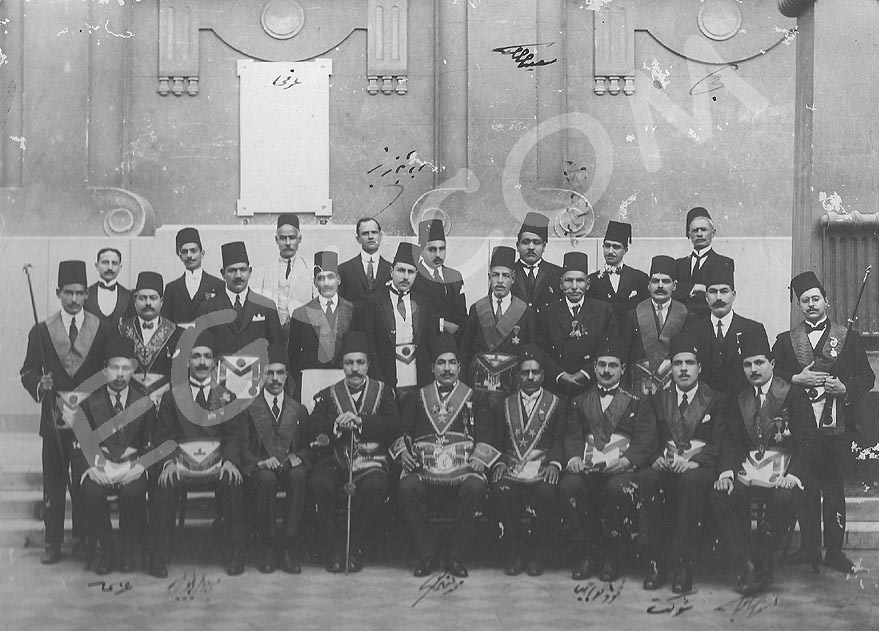
A Cairo loge meets in the 1940s under portrait of King Farouk
below: freemason certificate (courtesy Omar Hamed Zaki)
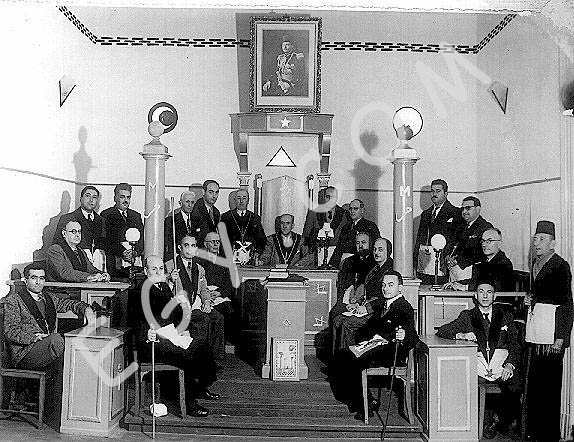
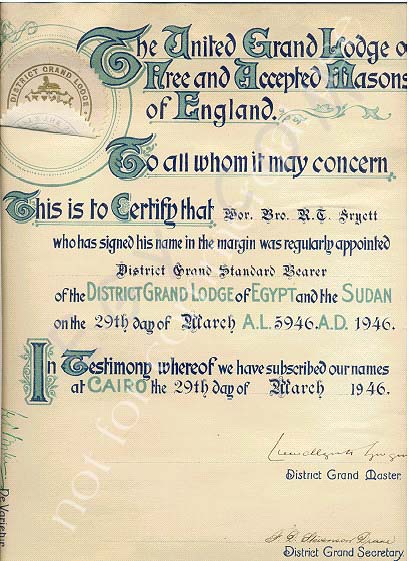
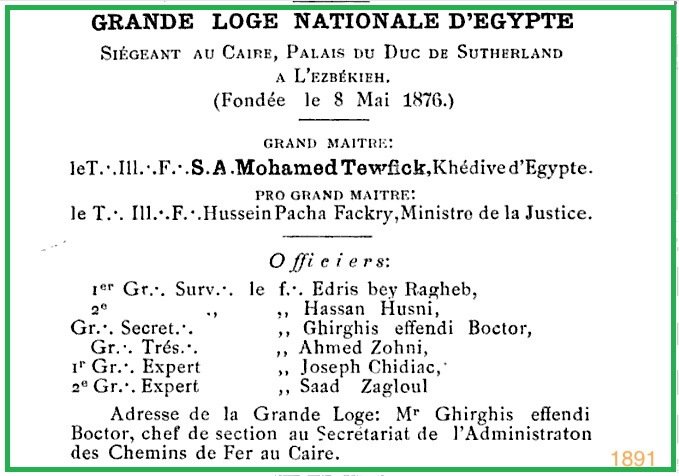
1891 senior Freemason Lodge members who besides Egypt's ruler include among others future nationalist prime minister Saad Zaghloul Pasha
Last month in Jordan a prestigious lineup of Western leaders led by incumbent President Clinton and three former US presidents paid their respects to the late King Hussein. While all kinds of deductions as to why they all turned up were disputed live on national TV, from Bangkok to Cape Town, one inference was passed by. The wily king may have been a Prince of Jerusalem, one of the highest titles conferred by Freemasons.
Whether or not Hussein visited Masonic lodges there are persistent claims in certain circles the Jordanian monarch was an honorary Grand Master. Not peculiar for a king who spent most of his reign juggling alliances, some more treacherous than others.
As an alleged Freemason King Hussein kept excellent company. Besides the Mozarts, Goethes and Garibaldis, most of Europe's royals and several former American presidents including its sitting vice-president, are professedly on the Masonic roster.
But wait a minute! Hussein Ibn Talal far from being a Westerner was a descendant of the Prophet. How then could a Moslem notable of his standing become a member of a secret society with origins in the heartland of a 17th century Judeo-Christian Europe?
Adapting the Big Bang theory to Freemasonry, we discover how the French Revolution and subsequent Napoleonic Wars accounted for the dissemination of the 'Society' outside its known borders. Which is why, by the late 19th century, Masonic lodges were scattered across the Ottoman Empire, from Constantinople where Young Turks were beguiled by the secretive brotherhood, to Greater Syria and Egypt where emerging nationalists aped their European assailant in their inherent opposition to autocratic authority.
In Egypt Freemasonry imploded into feuding camps: Anglo-Saxon and French, ostensibly reflecting the dual imperialistic control--military and cultural-- which had entrenched itself along the Nile Valley.
A favorite Masonic hall south of the Levant was Kawkab al-Shark--Star of the East. Somehow, its closeness to after-life symbolism conjured up echoes of the cult of Isis and Osiris giving it a distinct character and flavor.
Lodges evidencing Ancient Egyptian names included Sphinx, New-Memphis, Pyramids, Cheops and Le Nil. Founded by Jules Cesar Zivy the latter loge was dependent on the Grand Orient of France.
The distinction of first modern Freemason in Egypt goes to General Kleber, the luckless man left behind by Napoleon to govern the his "Oriental Empire.
From Kleber up until April 1964, Freemasonry continued uninterruptedly in Egypt. What had started as a secret movement eventually came out in the open as evidenced by notices in newspapers, the social pages and other forms of printed media.
Historians may however assent Freemasonry in Egypt came out of the closet during the 1882 Orabi Revolt. That Ahmed Orabi Pasha was himself a member of the Order was never proven, we know however several of his supporters were.
In his book How We Defended Orabi A.M. Broadley declares that Egypt's most liberal cleric, Sheik Mohammed Abdou, was himself an avowed Mason. "Sheikh Abdu was no dangerous fanatic or religious enthusiast, for he belonged to the broadest school of Moslem thought, held a political creed akin to pure republicanism, and was a zealous Master of a Masonic Lodge."
Later in the same paragraph Broadbent states many deputies in the egypt's budding legislature hastened to join the craft.
Broadbent gives us an insight on Freemasonry in Egypt during the 1880s when he differentiates between the principles and practice of Freemasonry in England and on the continent in Europe. While the British system embraced nothing more exciting than charity and good-fellow-ship, "foreign Masonry is almost avowedly an appropriate and convenient arena for political discussion, and both political and religious agitation."
Thus, according to Broadbent, "in Egypt the tenets of continental Masonry, with its Republican watchwords of Fraternité, Liberté, Egalité had evidently overshadowed the strong British elements which once prevailed in our numerous lodges."
Although none of the leaders of Egypt's National party belonged to the brotherhood, a large number of their subordinates were among its most active and zealous members, according to Broadbent.
Part of a budding middle-class, Egyptian nationalists had joined the Society in an attempt to penetrate an impregnable ruling class guarded jealously by Mohammed Ali's descendants and their Circassian entourage.
Consequently, when the Khedive's men arrested the sir-tujar (provost of the traders guild) of Sharkia charging him with conspiring against the state and supporting Ahmed Orabi Pasha's "insurgency" with money and the like, it was a Freemason barrister from London who took up his defense.
Nevertheless, the British-led kangaroo court in Cairo declared Orabi and his Freemason supporters guilty as charged--they had dared ask for the substitution of khedivial absolutism with a more representative government.
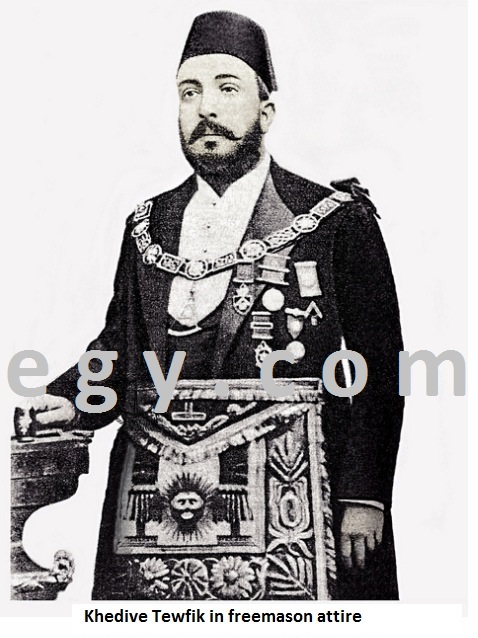
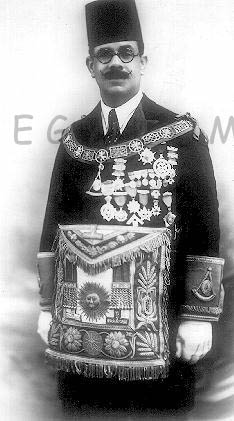
Judge Ragheb Idriss Bey ex-governor of Kalioubieh, Grand Master and Sovereign Grand Commander of Egypt
below: announcement in al-Ahram of his re-election as Grand Master in 1897
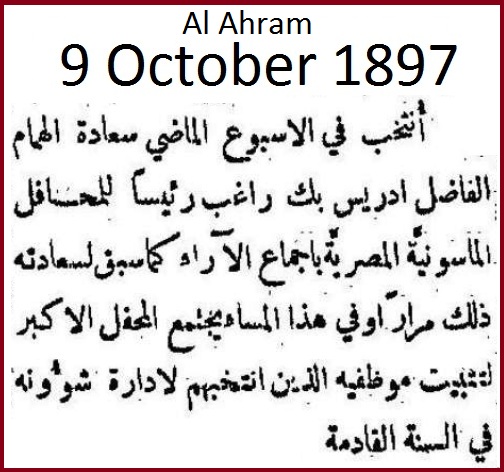
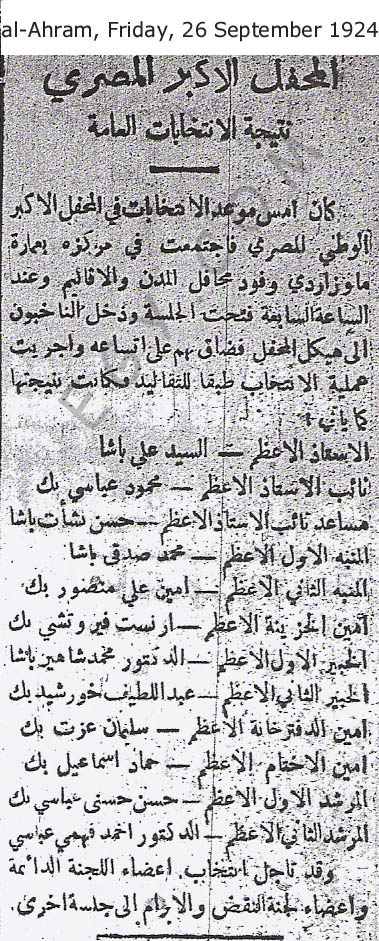
Grand Loge of Egypt election results November 1924
While Orabi was exiled to the British crown colony of Ceylon, the sir-tujar and other Orabi sympathizers were sentenced to imprisonment and fines ranging from LE 1,000 to LE 5,000.
The situation turned on the British several decades later with the arrival of Mohammed Farid and Saad Zaghloul. Self-declared Freemasons they respectively headed the National and Wafd parties which called for popular uprisings against Egypt's Anglo-Saxon occupiers.
With time, inter and intra-Freemasonry rivalries increased in proportion to the numbers of halls and lodges surfacing acrossr Egypt. Scottish, French, Italian and English halls operated side by side with the National Grand Lodge of Egypt. There was even talk of a Masonic cemetery in Old Cairo to be shared with freethinkers and intellectuals.
Worse still as evidenced by the local press in 1925 when some women in Alexandria clamored for membership in the ‘brotherhood’ !!!!
Besides the British Craft and Marks Masons, the most important Halls within Masonic circles in Cairo were the Grecia and Bulwer lodges overlooking Midan Ismail (today, Midan Tahrir).
The Egyptian Gazette dated 9 January 1903, states that "the new Masonic Hall [used by both lodges] comprises a commodious and handsome lodge-room capable of seating 100 brethren; a large assembly room; committee secretaries' and robbing rooms; as well as a refreshment room opening on to a spacious terrace whence a magnificent view is obtained on the new building of the Museum of Antiquities, Kasr-al-Nil barracks, the Nile and the open country beyond with the pyramids in the far distance." Both these lodges reported to the Grand Lodge of England
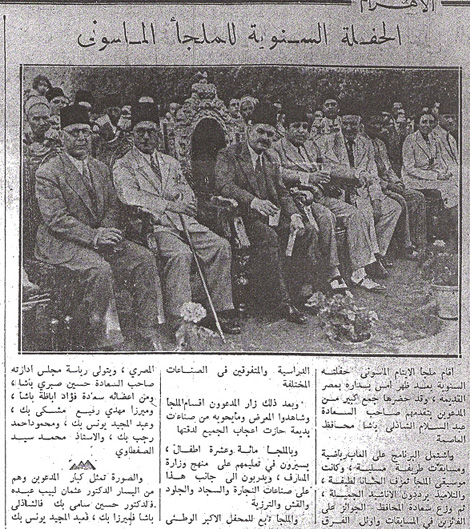
al-Ahram 4 July 1938; freemason benefit in Old Cairo
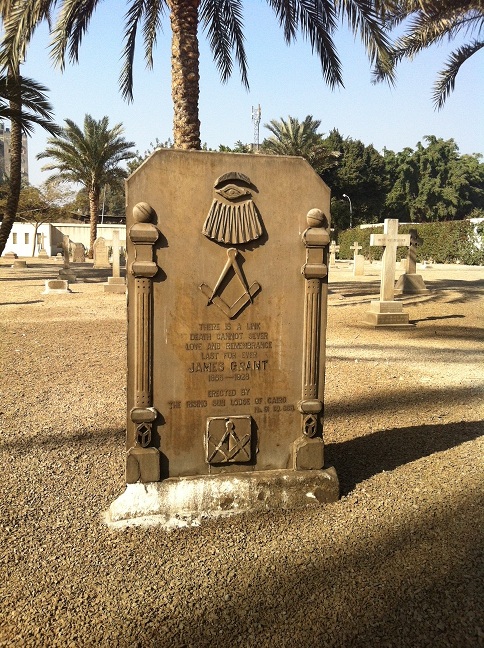
tombstone of Freemason in Old Cairo cemetery erected by the Rising Sun Loge of Cairo
At the time there were about 54 Egyptian lodges operating in Um al-Dunya. Later, between 1940 and 1957, we find 18 Masonic halls listed in Cairo, 33 in Alexandria, 10 in Port Said, 2 in Mansourah, 2 in Ismailia and one each in Fayoum, Mehala al-Kobra and Minieh (numbers fluctuated slightly during the interim yeas). Throughout that period, the largest and most important Masonic Hall was located at No. 1 Toussoun Street in Alexandria.
Ignoring its working-class origins, modern Freemasonry now sought to attract the privileged elite. And since faith did not really matter, Anglicans, Catholics, Jews and Moslems from the power elite rubbed shoulders in Lodges and Halls across the Middle East. After all, one of the Society's basic ideas was the rejection of dogma.
But the society's secretive character rendered it an easy target for defamation and accusation. History abounds with situations where Church and State took turns at vilifying the brotherhood often rendering it more surreptitious than it already was.
If Freemasonry burst its banks during the French Revolution when an entire nation revolted against church and state, it met with a devastating crisis during WW2 when Europe's traditional societies all but crumbled with thousands of Freemasons ending their lives in German concentration camps.
Other wars and revolutions from Italy to Latin America alternately pushed Freemasonry into the forefront of national and international events.
As attacks against Freemasonry multiplied in 19th century Europe, one race was repeatedly singled for a favorite target.
Living as a minority almost everywhere Jews perceived the Society as a way to achieve equality--and with time they became the torchbearers of Freemasonry. And since much of the Masonic symbols, rituals and erudition were linked to Jewish mystic, the accusations cropped up whenever an economic crisis loomed or when the purported Judeo-Christian alliance fell out of favor
The Vatican, which saw any brotherhood other than its own (eg. the Knights of Columbus) as a major threat, was at the vanguard of anti-Freemason movements fanning the flames of the 'conspiracy' controversy whenever possible. But since Christendom had little influence in a predominantly Moslem Ottoman Empire, the expansion of Freemasonry among its cosmopolitan elite went on unhindered.
But as we can see from the local press the Holy See and al-Azhar al-Sharif need not worry. After all Grand Lodges were peopled with humans who typically fought among themselves both privately and publicly. For instance, in October 1923, the result of in-house elections, members of one of the more important Egyptian Lodges accused each other in the press. It seems election manipulation and ballot trafficking had taken place. So much for secrecy and cloaks and daggers!
"In a characteristically tolerant Egypt, Freemasonry grew more out of fashion than conviction. It was more public than secret" comments Karim Wissa, an Egyptian diplomat who submitted a paper on local Freemasonry at Oxford. Like many of his brood and generation, Wissa can attest to at least one great-grandfather having been a District Grand Master.
"There were two kinds of Freemasons in Egypt in those days" says Wissa, "those like my landowning ancestors who adhered to the traditionalist English Freemasonry, and others who because of their fervent nationalism, joined the liberal French lodges headed in Egypt by Azhar luminaries Gamal al-Din al-Afghani and his disciple Mohammed Abdou. Interestingly, both men tended to address their companions as 'ikhawan al saffa wa khullan al wafa'(sincere brethren and faithful companions)." [Note: this form of greeting emanated from a distinct school of thought linked to Islamic enlightenment going back to the Abbassid dynasty].
From Khedive Ismail to King Fouad, Egypt's monarchs accepted honorary Grand Masterships. Yet none of Egypt's monarchs were physically initiated into the National Grand Orient of Egypt and their attendance was restricted to official portraits hanging on the walls of Masonic lodges and halls. Other District Grand Masters included British High Commissioners (ambassadors) as well as several Sirdars--British commanders of the Egyptian army.
When Farouk ascended the throne, Freemasonry in Egypt was fast becoming "guilty by association," accused of entertaining strong Zionist affiliations. This accusation was subsequently refuted in a study conducted by a team of diplomats attached to the office of Egyptian Foreign Affairs minister Dr. Mahmoud Fawzi.
In the minds of traditionalists, the physical similarities between Masonic halls and B'nai B'rith lodges --a Judeo-Zionist organization fashioned upon the Masonic model- were far too obvious for anyone not to confound the two. And because they were seen as hand in glove it is doubtful the young king ever supported the Society as such.
Once WW2 came to an end, B'nai B'rith lodges in Cairo and Alexandria were summarily closed down
"Hadn't the analogous B'nai B'rith done everything in its power to turn Palestine into an exclusive homeland for the Jewish Diaspora?" exclaimed the growing number of Masonic detractors.
Which is why following the creation of the state of Israel in 1948, it was open season for opponents of Freemasonry to pursue their claims that Masonic halls were subversive and dangerous, bent on undermining Arab nationalism and patriotism. This was almost a replay of the Vatican's anti-Freemasonry whisper campaigns propagated in the middle of the last century and early this one
Anti-Freemason articles cropped up in the post-1948 Arab World "proving" the connection between Zionism and Freemasonry. In Egypt, arguments leveled against Freemasonry were selectively derived from fin de siècle freemasons George Zaidan and Shaheen Makarius. Both writers commended contemporary businessmen and entrepreneurs, many of them Jewish, for their active role in reviving Egypt's capitalistic economy. Six decades later their statements were salaciously re-interpreted so that businessmen and entrepreneurs of the past were portrayed as eager tools of a Judeo-Zionist collusion bent on dominating the regional economy
As the predominant conspiracy hypothesis took credence in the Near East, the legality of Freemasonry was questioned and subsequently tabled on the Arab League's agenda. Eager to Jump on the bandwagon authors and journalists wrote on the subject. In his 660-page volume entitled "Freemasonry In The Arab World" Hussein Omar Hamada dedicates much of his book juggling Masonic conspiracy theories
With the post-1952 exodus of Egypt's haute khawagerie, lodges and Masonic temples lost many of their more affluent members. Meanwhile some freemasons, whether out of fear or self-interest simply stopped turning up at the meetings so that even the all-Egyptian Star of the East had a hard time supporting itself!
On 4 April 1964, the Masonic Temple on Alexandria's Toussoun Street was shut down by order of the Ministry of Social Affairs. The reason: "Associations with undeclared agendas were incompatible with rules covering non-profit organizations."
Sufficiently disturbing evidence for the State to be concerned about Freemasonry's political goals would turn up the following year in Damascus when master spy Eli Cohen was apprehended. Having eluded Syrian intelligence for many years posing as an Arab, it was discovered Eli had been a freemason in Egypt where he was born.
Yet despite the 1964 decree declaring the demise of Freemasonry in Egypt, loud cries of "not so" can still be heard. And if one were to concede to Abou Islam Ahmed Abdallah's book "Freemasonry In Our Region" 1985), Freemasonry is alive and well in the guise of Rotary Clubs and other like-minded associations. "Having accomplished their earlier mission to establish a Jewish state, Masonic conspirators now intend to undermine Islam using charity work and community outreach as their tools" says Abdallah in his opening chapter. He then consecrates a substantial portion of his elusive writing equating the "new Masonic cancer" with Rotary and Lions organizations and with Jehovah's Witness, Freedom Now, Solar Tradition, New Age and several other "fringe" organizations. Had NGO's been around then, Abdallah would have surely shortlisted them as well.
Like it always has been in the past, theories of sinister plots by ambiguous secret societies and associations still make headlines. So much so that books linking the British Royal family to Masonic Grand Masters and 'breaking news' detailing President Francois Miterrand's secret relations with the Brotherhood have become common literature
For sure, as we enter a new millennium, Masonic handshakes and cranky rituals continue to excite certain elements within our society.
Former Masonic Halls in Cairo: Where were they located?
- Tiring Building on Attaba Square.
- Acher Building off Champolion Street (where Townhouse Gallery is located today).
- Freemasons Hall, Madrassa al-Fransawi Street, Mounira.
- Building at corner of Antekhana and Mahmoud Bassiouni Streets.
In view of the many emails sent asking about the existence of masonic halls/lodges in Egypt, the answer is there are none.
More on Freemasonry
|
Reader Comments
|
Hany Sidhom"
Date: Sat, 29 Sep 2007 20:10:29 -0700
I was very much fascinated with your article about the Freemasons in Egypt. My father used to be a freemason during the period 1940 till it closed in 1964. I would love to hear from anyone still alive who knew him during this time. He is deceased now. His name is Nabil Sidhom. He was member in the lodge in downtown Cairo Champolion street.
Date: Mon, 21 Nov 2005 11:18:04 EST
From: Barrypyle87@aol.com
I have just read your article on the web and wonder if you have come across anything on the Sphinx Lodge No 263. It was a regimental lodge formed in 1861 within the 20th Regiment, Lancashire Fusiliers. The regiment were involved in Egypt and the lodge banner is still on display in Hong Kong. The Sphinx is also depicted on the old regimental banner held in England. The Sphinx lodge travelled widely but was eventually closed in 1907 when it was struck of the Irish Grand Lodge. I have some of the regalia from the Sphinx lodge and at the moment I am trying to research its history. I would be interested in anything you have.
Sincerely,
Barry Pyle
Date Sent: Saturday, March 02, 2002 10:15 PM
From: Tara Thielhelm
Subject: Masons in Egypt
I am a longtime resident of Egypt and I was fascinated by your article on masonic organizations in Egypt. The father of a close friend of mine belonged to a masonic lodge, and when h e died he left her a piece of jewelry in the shape of a golden ball that opens up to the symbols of the pyramids interlaced with signs of the crucifix and the Jewish star of David. She is very curious about this piece and so I was wondering whether you could recommend a book, web site etc. where she could find out more information about it, and the Egyptian masonic lodges in general.
Thank you.
Tara Thielhelm
Subject: Cairo
Date: Wed, 6 Feb 2002 14:45:32 -0500
From: Georgia Hershfeld"
I recently found a Ritual der Loge Friedrich der Grosse no. 71, Cairo dated 1905 in the library of the Grand Lodge of New York. Can you give me any information about this lodge? Working under whose jurisdiction? Thank you for your assistance.
Sincerely yours,
Georgia Hershfeld
Library Cataloguer
Livingston Masonic Library
Subject: Family research
Date: Tue, 1 May 2001 09:41:15 +0200
From: "epg"
I am writing to you as I have exhausted other channels of info for the
subject. The Pinto family arrived in Alex in 1863 and left in 1956. I have gathered a lot of personal material but cannot find background info about Masonic lodges and Scottish Rite lodges before W War2: there were two in Alex and one in Cairo.
Also, King Fouad was Supreme Head of the Scottish Rite. Can you help?
Edgar Pinto
Subject: Freemasonry Article 99-03-01
Date: Fri, 23 Apr 1999 10:43:06 GMT
From: sfitz@bigfoot.com (Scotty Fitzgerald)
I recently read and enjoyed your online article on Freemasonry in the online edition of the Egyptian Gazette. I don't know if I am asking too much, or even if inquiries of this kind are welcome, but I am constantly doing research on a no longer practiced body of masonic ritual known as "Memphis." It was not likely that this body originated in that famous city, but it was styled to have originated in that city (a lot like "Scottish Rite" really comes from France.) I was wondering if you you could email me as to whether this Rite was ever practiced in Egypt? Thank you for considering this request. Yours,
Scotty Fitzgerald 32?, MPS
JD, Yorktown Lodge #1154, New York,USA.
Charter Member, Panel of Moderators for soc.org.freemasonry
Member Grand College of Rites, USA
Subject: Hello and comments
Date: Wed, 28 Apr 1999 19:07:09 +0300
From: Touvia Goldstein teddyg1@netvision.net.il
I have read your excellent article on Egiptian Freemasonry that, in reality, extends itself to many other islamic countries. I am very much interested in these issues and especially I have been researching the masonic affiliation of HM King Hussein and do not seem to find no documents that testify this. Would you have any information on this respect? Would you be so kind and refer to me other literature concerning Freemasonry in Arab and islamic countries and the relation between the Islamic religion and freemasonry. Looking forward to your reply. Yours truly,
Teddy Goldstein
Subject: A little Masonic Light
Date: Wed, 28 Apr 1999 16:28:14 EDT
From: QBERT143@aol.com
You will never find out what you're looking for with all of the misinformation, and no understanding of the Masonic work. Don't take it for granted that because somewhere in you studies it says this or that, and all is true. Just like yourself trying to write about something that you know nothing about, and don't understand, but some other people will read your article and think it to be true. May I suggest that you write on something you know about and not what you think you know about, which has been compiled by others who know no more about the subject than you do? Good luck on your search for Light in Masonry, but I guess you'll never know until you become a member and learn in your heart what its all about.
William Bell
>
Past Master of Youngstown Lodge #615
>
Youngstown, Ohio
USA
Subject: Article on Freemasonry
Date: Thu, 29 Apr 1999 12:09:14 -0500
From: "Jessett, Nick" Nick_Jessett@mhhs.org
I would like to thank you for writing, in my opinion, the most bias free article on Masonry that I have ever seen. Without being cynical, I am surprised. I have been a Freemason since 1994, and have had to suffer through slanted press since that time. Your article, on the other hand, was excellent since it told just the facts, and you did not try to persuade your audience one way or the other. Ours is a gentle craft that teaches brotherly love and charity. Perhaps, with all the senseless killing that is rampant today, a little more of these teachings would go a long way. Thank you again. Thank You,
Nicholas Jessett
Park Place Masonic Lodge 1172, AFM
Houston, Texas, USA
Subject: Learning about Freemasonry
Date: Thu, 29 Apr 1999 20:32:06 -0400 (EDT)
From: "Dr. Roger M. Firestone" rfire@chele.cais.net
I understand you might like to learn more about this subject. Please feel free to visit my Web pages on the subject. The URL is: http://www.cacr.caltech.edu/~rfire/masonry/ You may also email me if you have further questions.
Roger M. Firestone, 32 KCCH
Past Master, National-Stansbury-Dawson #12, FAAM of DC
Musician/Lodge Educ. Officer, Henry #57, AFM of VA, Fairfax City
Subject: Several points...
Date: Thu, 29 Apr 1999 21:59:24 -0400
From: Zoo Keeper candiazoo@mediaone.net
Organization: The Candia Zoo
Freemasons do not believe in subversive action toward their government. Freemasons are not all Christian and in fact welcome anyone who has faith in a supreme being/creator. Freemasons are taught to treat all humans with respect and charity. Freemasons do not meet in any "guises". If they cannot meet as Freemasons with the appropriate ritual, their lodge(s) go DARK. Ie. they no longer meet. May I ask your intent in writing this article?
Mike
Subject: Your article about Freemasonry
Date: Fri, 30 Apr 1999 11:53:22 -0500
From: "Tom Strickland" tas@sound.net
The only conspiracies that I have encountered, in thirty years of Masonry, have been from religious zealots, fearing the loss of power. I can't figure out whether your article is pro or anti masonry, although I was constantly reminded of Marc Anthony's funeral oration. I still can't figure out what you are trying to say. Respectfully,
Thomas A. Strickland, Jr., MM, etc.
SUBJECT: freemasonary/knights templar
Date: Fri, 2 Jul 1999 15:03:57 +1000
From: "Tracey Kirk-Norris" tkirknor@davidjones.com.au
Have you heard about a book called "The Second Messiah". It alleges that the Freemasonry Society or the Knights Templar actually came about a lot earlier than the 17th century. In fact I think it alleges it came about after the destruction of Herod's temple as a consequence of needing to keep safe the documents left after the massacre. You commented on Jews being affiliated--that would be because of the connection to Herod's site. I recommend this book as a read if you are interested in theories about this society. Regards
Tracey Kirk-Norris
Technical Analyst - IT
DAVID JONES LIMITED ACN 000 074 573
Phone: 029266-6084
Fax: 029266-5452
Re: Freemasonry in Egypt
Date: Sun, 25 Jul 1999 09:15:03 EDT
From: STARVLINGB@aol.com
I found your article most interesting. I am an author who lives in England but was born in Egypt. I am presently writing a book about the links between the Brotherhood and Egypt. I will be in Egypt from 28 July to 5th August 1999. Could we meet? I have plenty of first hand material you may enjoy seeing.Warm regards
Robert Bauval
Subject: freemasonry
Date: Fri, 19 Nov 1999 11:40:06 GMT
From: "Furqan Ul-Jabbar" furqan5@hotmail.com
Assalaamuwalaikum,
Sorry to disturb you! I have read your article on Freemasonry in Egypt, and was quite impressed by the detail you presented. Out of curiosity are you a freemason? Regardless if you would like to learn more about freemasonry in relation with the Islamic world.
M. Furqan Ul-Jabbar
Subject: freemasonry
Date: Fri, 8 Sep 2000 10:10:45 +1000
From:"fady el-moubayed" <e_fady@hotmail.com>
The masons and the Dajjal--deceivers are
prophesized by Prophet Mohammed. The introduction of masonry in
Muslim lands is the upcoming fulfillment of that
prophecy. Mustafa Kamal "Attaturk" with the help of masonry destroyed the caliphate
ushering the beginning of the Dajjals rule
The Mahdi will come and destroy the masons and their leaders
It is the masons who destroyed Islam although they won't
admit it and are presently assassinating the character of
Muslims here in Sydney where I live (next to the Olympic
2000 home) by calling us terrorists and vigilantes--an obvious plan by the masons just before the
Olympics start.
|
EGY.COM - COMMUNITY









